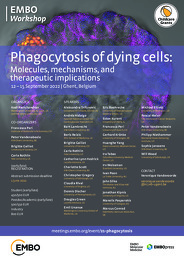About the Workshop
Everyday, we turnover >100 billion cells in our bodies. The excess, used, or damaged cells that turnover usually die and are then recognized and removed by nearby or recruited phagocytes. Phagocytosis is highly regulated and evolutionarily conserved, and critical to development, maintenance of tissue homeostasis, resolution of inflammation, and tissue regeneration after injury. The failure to promptly clear dying cells impact autoimmune conditions such as SLE, as well as presentation of dying tumor cell antigens after immunotherapies to generate anti-cancer immunity. Although apoptosis is the dominant death modality in homeostasis, other forms of cell death have been recognized such as necroptosis, pyroptosis, and ferroptosis, and these are linked to human diseases. How cells dying by these other modalities are cleared and affect the tissue neighborhood is becoming important. This EMBO Workshop will bring together a highly- distinguished collection of scientists broadly interested in the molecular mechanisms regulating the clearance of dying cells, responses of phagocytes, and the impact of cell death and clearance on tissue microenvironment, inflammation, repair, and human disease. We have designed an interdisciplinary workshop to promote interaction, exchange of ideas, and collaboration among students, postdocs, and leading researchers covering many exciting aspects of phagocytosis and related fields.
The program contains the following main subjects linked to phagocytosis of dying cells:
- Phagocytosis, metabolism, and tissue repair
- Phagocytes, cell death modalities, and disease connections
- Phosphatidylserine in phagocytosis and beyond
- Molecules and mechanisms of phagocytosis
- Ferroptosis and necroptosis in tissue inflammation
- Cell death, phagocytosis, and tissue regeneration
- Model organism based studies of cell death and phagocytosis
- Potential therapeutic applications
About EMBO Courses and Workshops
EMBO Courses and Workshops are selected for their excellent scientific quality and timelines, provision of good networking activities for all participants and speaker gender diversity (at least 40% of speakers must be from the underrepresented gender).
Organisers are encouraged to implement measures to make the meeting environmentally more sustainable.




